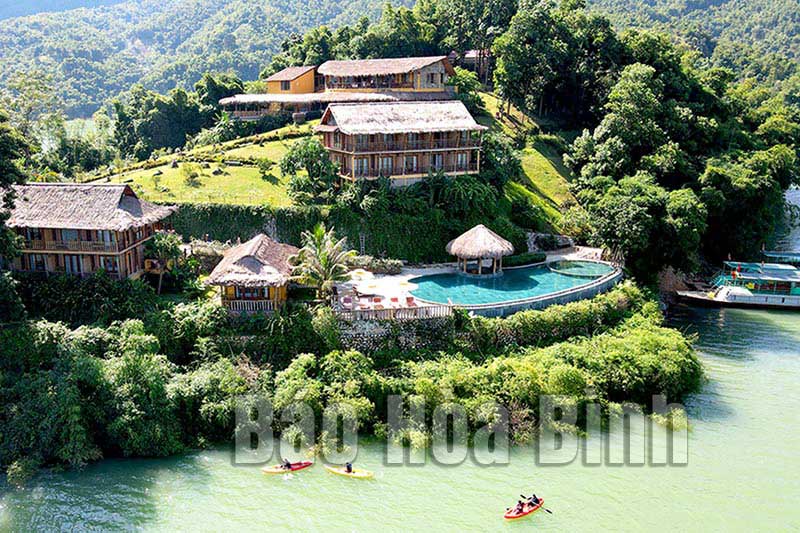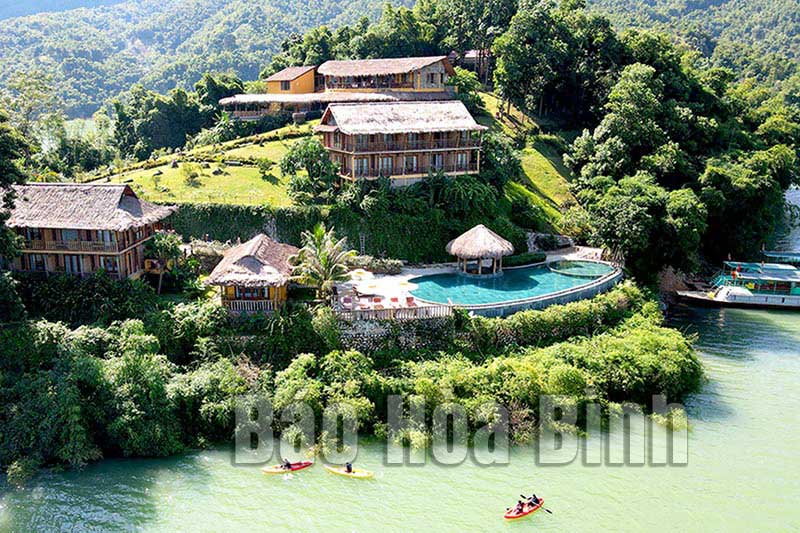
(HBO) – In the context that the lingering COVID-19 pandemic has severely affected tourism, Hoa Binh province is still one of the few localities in the northern region to record a stable number of visitors and have tourism activities not suspended for too long. Since late 2021, local tourism has been reactivated and rebounded strongly.
Mai Chau Hideaway in Son Thuy commune (Mai Chau district) is one of the
pandemic-free eco-resort sites with a beautiful natural landscape on Hoa Binh
Lake.
Aside from promoting domestic travel with
COVID-19 safety ensured, the tourism sector in Hoa Binh has been taking actions
to flexibly adapt to the pandemic, prepare for welcoming more tourists, and
diversify local destinations since Vietnam piloted the border reopening to
international arrivals.
A large number of new tourism products have been
launched to enhance the attractiveness of local destinations. Besides, the Hoa
Binh Tourism Association has encouraged businesses to develop potential types
such as cultural tourism, community-based tourism, eco-tourism, resort tourism,
and sports tourism.
To meet the manpower demand during the tourism
recovery process, authorities have opened several training courses on tourism
skills, sent local cadres and representatives of households to learn
community-based tourism management and development in Lao Cai and Son La provinces.
Hoa Binh has also actively worked to expand
tourism partnerships with northwestern provinces and build tourism cooperation
programmes with major travel hubs such as Ho Chi Minh City, Hanoi, Thanh Hoa,
Quang Ninh, and some nearby localities.
The 17th provincial Party Congress for the 2020
- 2025 tenure targets that tourism will be become a key economic sector. Hoa
Binh looks to attract 4.9 million tourist arrivals, including 1 million foreign
visitors, earn 5.4 trillion VND (236.2 million USD) from tourism, and create
about 26,000 jobs in this industry by 2025.
Photo:
Visitors to Tien Pagoda in Lac Thuy district seriously comply with
anti-pandemic rules.
For 2022, the tourism sector hopes to welcome
more than 2.5 million tourists and rake in over 2.4 trillion VND in revenue
which is expected to reach 900 billion VND in the first quarter, up 60 percent
year on year.
Nguyen Van Toan, Standing Vice Chairman of the
provincial People’s Committee, stressed that Hoa Binh now has a chance to
popularise itself as a safe, hospitable, and attractive destination among
travelers nationwide, especially those in Hanoi and HCM City.
This March, the provincial People’s Committee
and national flag carrier Vietnam Airlines are scheduled to sign a deal on a
comprehensive cooperation programme for 2022 - 2026 and an action plan for 2022
- 2023. Hoa Binh and other provinces in the expanded northwestern region have
also inked a cooperation agreement and planned to set up a safe tourism
corridor.
A diverse chain of eco-tourism and resort destinations concentrated in Hoa Binh city and the districts of Tan Lac, Da Bac, and Luong Son… Along with the launch of several key high-quality resort tourism projects, these developments have reshaped the landscape and enhanced the appeal of Hoa Binh as a travel destination.
Boasting diverse terrain, a mild climate, and rich natural resources, Cao Phong district is increasingly asserting its place on Vietnam’s tourism map, attracting both domestic and foreign visitors. The district is renowned for its stunning landscapes, majestic mountains, a crystal-clear hydropower lake, and the unique cultural identity of local ethnic groups.
With its pristine landscapes, unique cultural heritage of Muong ethnic minority, and an expanding range of visitor experiences, Tan Lac district of Hoa Binh has fast become a captivating destination for both domestic and international tourists.
Until now, Sung village in Cao Son commune, Da Bac district remains the only Dao ethnic community in Hoa Binh province to develop a community-based tourism model. Beyond its untouched natural landscapes, cultural identity serves as the cornerstone attraction for visitors.
Alongside the diverse cultural identities of the Kinh, Muong, Tay, Thai, Dao, and Mong ethnic people, Hoa Binh province is also renowned as the "capital" of the northwestern Vietnamese cuisine, offering unique and distinctive dishes. At festivals, during Lunar New Year (Tet), or on significant family or community occasions, special dishes are prepared, leaving a lasting impression on visitors.
A Phong Linh (Yellow Tabebuia) flower garden in Thang village, Thach Yen commune, Cao Phong district is currently in full bloom, drawing a large number of visitors.



